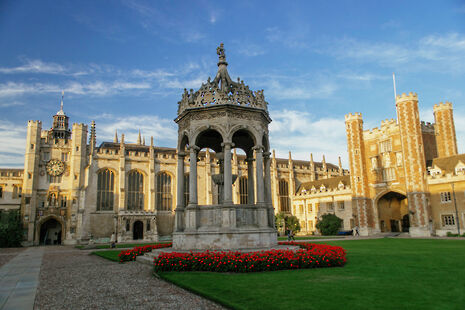Investigation: The true nature of Cambridge’s investments
Varsity investigates the millions of pounds that Cambridge colleges have invested in companies of ethical concern

This summer, Varsity has been working with the CUSU Socially Responsible Investment (SRI) Campaign on an investigation into the investment practices of Cambridge colleges. This has brought to light some colleges’ ethically irresponsible revenue streams, raising serious questions about the monetary source of the facilities and bursaries which we as students benefit so greatly from.
The University of Cambridge is the wealthiest university in the UK and in Europe. As of 2011 its endowment is valued at £4.3 billion, of which £2.7 billion is tied directly to the colleges. A large proportion of individual colleges’ funding comes from direct and indirect commercial investments and funds. Cambridge colleges each have an independent charitable status as institutions distinct from the University.
The University’s Statement of Investment Responsibility, dated July 2009, states: “The primary...responsibility of the Council in investing and managing the University’s...investment assets is to maximize the financial return on those resources”.
“However, there are circumstances, described in Charity Commission guidance…and founded in judicial decisions, when the University may balance against its primary responsibility considerations of the ethical nature of investments.”
This statement is not an official ethical investment policy however, and in this respect Cambridge lags behind other leading educational institutions. UCL, Oxford and St Andrews all have explicit policies for ethical investment, where regardless of returns, ethical parameters are set on investments.

The Colleges are separate legal entities from the University, and most also do not have explicit SRI policies. Responses to Freedom of Information requests reveal that many colleges have a list of investment portfolios which include major arms companies (including those manufacturing nuclear warheads and drones), tobacco manufacturers and fossil fuels companies.
Two of the worst offenders of unethical investment practice are Peterhouse and Trinity, the University’s oldest and richest colleges respectively. Peterhouse College has no written investment policy, but its Governing Body states:
“The College seeks to ensure that investments are not made in companies whose practices it believes to be in conflict with the charitable purposes of the College or likely to alienate a sizeable proportion of the members or benefactors of the College. In consequence the College currently excludes the shares of tobacco companies from its discretionary portfolios.”
Peterhouse therefore acknowledges the moral duty it has to its members and benefactors. Despite this, Peterhouse has investments in high-profile energy companies such as Surgutneftgaz, Novatek and BHP Billiton, all of which stand accused of some form of corruption and/or human rights offences. In 2011, the social and environmental consultancy firm RepRisk compiled a list of the 10 Most Controversial Mining Companies of the year – BHP Billiton ranked fourth. More worryingly, RepRisk reported that 90 per cent of Pakistani villagers living near BHP’s Zamzama gas plant are living with diseases caused by toxic gases emitted by the plant.
Peterhouse also has over £14,000 invested in Royal Dutch Shell, the largest oil company in the world. In Nigeria, Shell has been accused of being complicit in crimes against humanity, torture, inhumane treatment and arbitrary arrest and detention. A lawsuit was brought against Shell for these crimes and in 2009 it paid out $15.5 million in a legal settlement but admitted no liability. In 2010, a leaked cable revealed that Shell claims to have inserted staff into all the main ministries of the Nigerian government and that they knew "everything that was being done in those ministries”. Therefore including, presumably, the extensive human rights abuses of the Nigerian authorities.

Investment returns provide over half of Peterhouse’s income. These companies provide just a snapshot of the ethically questionable state of the College’s investments. The College declined to comment on the issue.
Trinity College has no such embargo on tobacco companies. The College has common stock holdings, a form of direct investment, in companies included in but not limited to the following sectors: mining, defence, nuclear warheads, drones, fossil fuels and tobacco. The vehicle for these investments is a Morgan Stanley Capital International (MSCI) tracker fund created and controlled by Trinity, which invests automatically in major worldwide companies, judged purely on the MSCI index. By this measure, market performance is the only factor determining investment, meaning ethical concerns are not considered. Many colleges use funds to manage their investments, but Trinity is unique in that it owns its own tracker fund and is therefore responsible for its decision to operate according to the MSCI index.
Many of the multinationals in which Trinity has direct investments have been involved in serious cases of corruption, bribery and systematic violations of human rights.
One example of this is Anglo American, one of the world’s largest mining companies and in which Trinity College has direct investment. In 2007 a report published by the charity War on Want accused Anglo American of a host of human rights breaches concerning their workers and the local residents of areas where the company mines, and of serious environmental pollution. The report said that the company benefitted from and exacerbated conflicts in areas of civil war such as the Democratic Republic of Congo, and that Anglo American had developed links with a “murderous armed group” in the area in order to facilitate its gold mining operations. This claim was based on a 2005 report produced by Human Rights Watch, which reiterated the same accusation.
According to the current share price, Trinity has £156,690.72 invested in Anglo American.
Trinity also has direct investments in the Australian mining company Rio Tinto, which has been widely criticised for the devastating environmental impact of its operations. In 2008, the Norwegian government divested itself of all its Rio Tinto shares, worth $820 million, and banned further investment in the company because of environmental concerns.
This year, former master of Trinity College Lord Martin Rees delivered a speech to the British Science Festival expressing his pessimism with regards to the reduction of global carbon dioxide emissions; however Trinity seems to be taking no steps to distance itself from one of the world’s biggest polluters. According to current share prices, Trinity has over £685,000 invested in Rio Tinto.
Responding to our investigation, Rory Landman, the Senior Bursar for Trinity College, said to Varsity: “In common with many investors the College owns these investments through an index tracking fund which invests in all major companies worldwide. These companies and many others are included.

“The College is an investor of a size where we have our own segregated tracker fund which means that legally we own the underlying shares rather than owning a share of a fund. This has certain cost advantages.”
However Daniel Macmillen, from the CUSU Sustainable and Responsible Investment Committee, believes the colleges have more responsibility than simply serving “cost advantages”. Speaking to Varsity, he said: "For all the immediate financial benefits unscrupulous investments may bring, they are incredibly costly in their implications. By abdicating their responsibility to uphold widely-shared moral principles in their investments, colleges have allowed their endowments to reap significant profits from environmental devastation and human rights abuses.
"In a world riven by major injustices and startling ecological prospects, it is no longer tenable to posture impotence. Whether we like it or not, our inaction and negligence lend tacit support to injurious practices around the world. That is the forgotten cost of the equation."
Tim Holt, Head of Communications for the University, told Varsity: “Some colleges, not including Trinity, invest through the University endowment fund...It is inevitable that some exposure will be made to [these companies]. All investment decisions are checked against an ethical code.”
Further details and analysis of the colleges' investments will be published in Varsity over the course of this term.
 News / Colleges charge different rents for the same Castle Street accommodation2 March 2026
News / Colleges charge different rents for the same Castle Street accommodation2 March 2026 News / News in Brief: waterworks, wine woes, and workplace wins 1 March 2026
News / News in Brief: waterworks, wine woes, and workplace wins 1 March 2026 News / Climate activists protest for ‘ethical careers policy’1 March 2026
News / Climate activists protest for ‘ethical careers policy’1 March 2026 News / Angela Merkel among Cambridge honorary degree nominees27 February 2026
News / Angela Merkel among Cambridge honorary degree nominees27 February 2026 News / Private school teacher who lied about Cambridge degree barred from teaching27 February 2026
News / Private school teacher who lied about Cambridge degree barred from teaching27 February 2026









